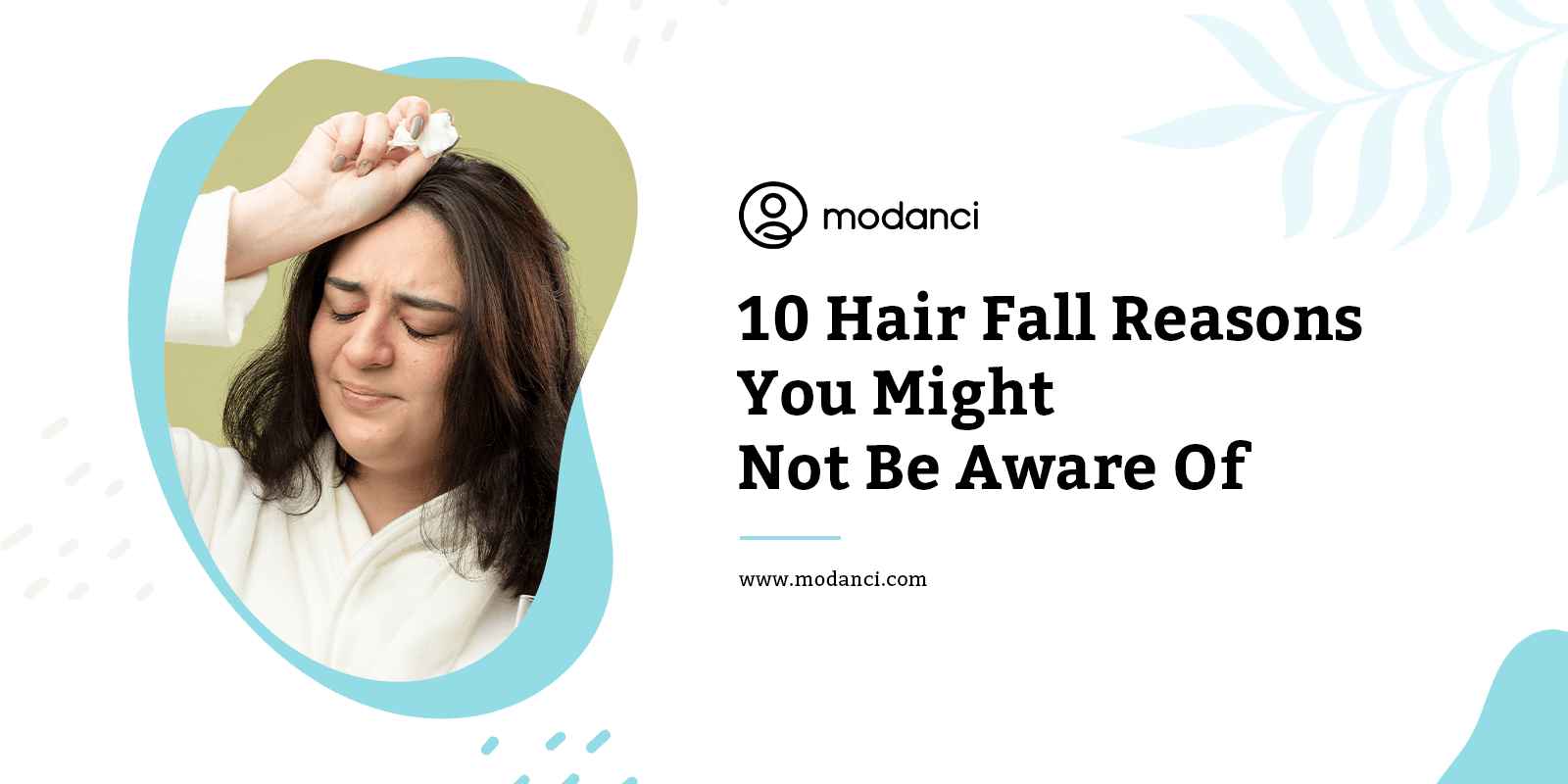Are you struggling with hair fall but can’t seem to figure out the root cause? Hair fall can be a significant cause of concern for many of us. While some hair fall is natural, excessive hair fall can indicate an underlying issue. There can be several factors contributing to hair fall that we may not be aware of.
In this article, we will explore ten reasons for hair fall that you might not be aware of. Understanding these causes can help you take preventive measures and keep your hair healthy and strong.
What is Hair Fall?
Hair fall, also known as hair loss or alopecia, is a common condition affecting millions worldwide. It refers to the excessive shedding of hair from the scalp, which can occur gradually or suddenly and affect both men and women.
While it is normal to lose some hair every day (about 50-100 strands), excessive hair fall can lead to thinning hair, baldness, and a loss of confidence. Understanding the causes and triggers of hair fall is essential to effectively preventing and managing this condition.
10 Reasons for Excessive Hair Fall
Experiencing hair fall can be frustrating and worrying for both men and women. While losing some hair strands daily is normal, excessive hair fall can indicate an underlying problem. By understanding the causes of hair fall, you can take steps to prevent it and promote healthy hair growth.
Here are ten hair fall reasons that may take you by surprise:
1. Nutritional Deficiencies
Poor nutrition or deficiencies in key nutrients like iron, vitamin D, and protein can lead to hair fall. Iron is necessary for producing haemoglobin, which carries oxygen to the hair follicles. Vitamin D helps absorb calcium, which is vital for hair growth. Protein is essential for the growth and repair of hair cells.
To prevent hair fall due to a poor diet, include a variety of nutrient-rich foods, such as leafy greens, nuts, eggs, and fish.
2. Hormonal Imbalances
Hormonal imbalances caused by PCOS, thyroid disorders, pregnancy, and menopause can lead to hair fall. Hormones like estrogen and testosterone play a crucial role in hair growth; any fluctuations in their levels can cause hair fall.
It is important to manage the underlying condition with medication or hormone replacement therapy to prevent hair fall due to hormonal changes.
3. Stress
High-stress levels can trigger a type of hair loss called telogen effluvium. In this type of hair loss, many hair follicles enter the resting phase prematurely and shed hair, disrupting the natural hair growth cycle.
To prevent hair fall due to stress, try to manage your stress levels through relaxation techniques such as yoga, meditation, or deep breathing exercises.
4. Medications
Certain medications like chemotherapy drugs, antidepressants, and blood thinners can cause hair fall as a side effect. To prevent hair fall due to medication, talk to your doctor about alternative treatments or ways to manage the side effects of your current medication.
5. Scalp Infections
Fungal infections like ringworm and bacterial infections like folliculitis can lead to hair fall. These infections can cause inflammation and damage hair follicles, leading to hair fall. Maintaining good scalp hygiene and seeking prompt treatment for any signs of infection is important to prevent hair fall.
6. Genetics
Hair fall can be hereditary and run in families. Androgenetic alopecia, or male/female pattern baldness, is a common genetic cause of hair fall. You may be more prone to hair fall if you have a family history of hair loss.
7. Autoimmune Diseases
Autoimmune diseases like alopecia areata can cause hair fall. These disorders occur when the immune system attacks hair follicles, leading to hair loss. It is important to manage the underlying condition with medication or other treatments to prevent hair fall due to autoimmune disorders.
8. Chemical Treatments
Over-styling using chemicals like hair dyes, bleaches, and relaxers can also damage the hair follicles and cause hair fall. To prevent hair fall due to chemical treatments, try to limit your use of these treatments and use gentle, natural products on your hair.
9. Heat Styling
Excessive heat styling using tools like straighteners and curling irons can damage the hair follicles and lead to hair fall. To prevent hair fall due to heat styling, try to limit your use of these tools and use heat-protectant products when styling.
10. Poor Hair Care
Poor hair care practices, such as using harsh shampoos or brushing your hair too vigorously, can cause damage to your hair and lead to hair fall. To prevent hair fall due to poor hair care, use gentle, natural hair care products and avoid brushing your hair when wet.
Conclusion
Excessive hair fall can be caused by various factors, ranging from nutritional deficiencies to genetic predisposition. It is crucial to identify the underlying cause of your hair fall and take appropriate steps to address and prevent it. Consult an Ayurvedic physician if you are experiencing excessive hair fall or have any concerns about your health.
By following a healthy lifestyle, taking care of your hair, and seeking medical attention when necessary, you can keep your hair healthy and prevent excessive hair fall. Remember, hair fall is a common problem; you are not alone. Take the necessary steps to address the issue, and you’ll be on your way to healthier, stronger, and more beautiful hair.
Modanci’s Potensified Ayurvedic Solution For Hair Growth And Maintenance includes a Handcrafted Organic Jatamansi Kokum Shampoo Conditioner Bar, an Ayurvedic Hair Oil, Nasya Oil, and Hair Tablets. Answer a few questions and discover personalised solutions that help you manage your hair and scalp health, reduce hair loss, and promote hair growth!
FAQs
1. What are the top three hair fall reasons that people are often unaware of?
The top three hair fall reasons people are often unaware of are hormonal imbalances, stress, and poor nutrition. Hormonal imbalances can occur for various reasons, such as pregnancy, menopause, or thyroid disorders, leading to hair loss. Stress can also be a major factor in hair fall as it triggers an increase in androgen levels, leading to hair loss. Poor nutrition, including essential vitamin and mineral deficiencies, can cause hair fall.
2. How do hormonal imbalances contribute to hair fall, and what can be done to address this issue?
Hormonal imbalances can cause hair fall by disrupting the normal hair growth cycle. Hormones like estrogen, testosterone, and thyroid hormones are important in maintaining hair growth and health. When these hormones become imbalanced, they can cause hair follicles to shrink and produce thinner and weaker hair strands, leading to hair fall.
Addressing the underlying hormonal issues through medication, lifestyle changes, or natural remedies can help prevent hair fall.
3. Can hair styling and products be a cause of hair fall, and if so, what should I do to prevent it?
Yes, hair styling and products can be a cause of hair fall. Chemicals in hair products, heat styling tools, tight hairstyles, and over-brushing can all cause hair damage and breakage, leading to hair fall. To prevent this, avoid using hair products that contain harsh chemicals and limit the use of heat-styling tools.
Opt for loose hairstyles and avoid tight braids, buns, or ponytails. Additionally, be gentle while brushing and use a wide-toothed comb or a brush with soft bristles.
4. What role does stress play in hair fall, and how can I manage my stress levels to prevent hair loss?
Stress is a significant contributor to hair loss, as it can disrupt the natural growth cycle of hair follicles. Experiencing high-stress levels can trigger hair follicles to enter the resting phase of the hair growth cycle, leading to hair thinning and shedding.
Managing stress through relaxation techniques, such as meditation, deep breathing, or yoga, can help prevent hair loss. Regular exercise, a healthy diet, and getting enough sleep can help reduce stress levels and promote hair health. If you are struggling with severe stress or anxiety, consider seeking professional help from a therapist or counsellor.
Read More:




